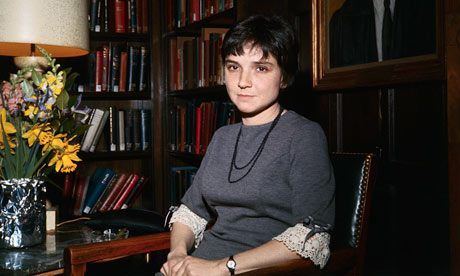Eve Ensler writes:
"The moment when a feeling enters the body is political. This touch is political."
I must have read and reread those particular words from Adrienne Rich's poem "The Blue Ghazals" thousands of times, as if the repetition would somehow dissolve the lines drawn between the personal and political, the singular and the collective, the private and the public, the body and the earth.
Adrienne Rich's poems were acts of change, explosive political entities, never tricks or games or vain displays of craft (although they were exquisitely crafted). Reading her, I understood that poets were not meant to hover above the world; poems were burned in the grief, loneliness and outrage of the world. Her poems were rhythmic mappings of survival. She did not mean to be an activist. She meant to tell the truth in the language of her body. Her poems broke taboos and questioned the givens. I read "The Blue Ghazals" when I was 18 years old, and Rich made me believe for the first time that perhaps the bifurcation of struggle and song was not in fact the path to great literary achievement, but instead a dangerous road to narcissism, abstraction and denial.
She taught me that the lives of women existed in the future. And that language was the pathway to that future. She taught me women were living lives inside constructs of lives and that poetic grace and surprise could reveal and shatter those constructs.
She taught me women could be angry – and that anger is fertiliser. And she taught me that "… poetry can break isolation, show us to ourselves when we are outlawed and made invisible, remind us of beauty where no beauty seemed possible, remind us of kinship where all that seems possible is separation".
Adrienne Rich is gone now. "The moment when a feeling enters the body is political." If we could measure the immensity of her loss or the genius of her writing or the fervour of her love, we might be near revolution.
Jackie Kay writes:
"All new learning looks at first / like chaos," says Adrienne Rich in one of her most recent poems collected in Tonight No Poetry Will Servepublished just last year.
Adrienne Rich has died at the age of 82 and was working at the coalface of poetry right up till near the very end. Poets don't retire. A writer as respected for her progressive vision in her theory as much as her stylistic panache in her poetry, Rich was a pioneer. A Jewish lesbian poet, she believed that the personal, political and poetical are inseparable. Some critics called her poetry polemical; yet the intensity of her gaze and her controlled use of diction, her formal reinvention is what is astonishing about her work.
She did that rare thing: make you think with your heart and feel with your head; she was a poet who appealed to the intellect as much as the emotions, and in that sense she had much in common with her old friend Audre Lorde.
In 1974 Rich refused to accept the National Book award for her masterpiece Diving Into the Wreck unless she could also accept it with the fellow nominees, Alice Walker and Lorde. "We are, I am you are / by cowardice or courage / the one who find our way / back to the scene / carrying a knife, a camera / a book of myths / in which / our names do not appear."
Adrienne Rich's name appears now. She was a woman who formed identity politics before the phrase was coined, who dreamt of a common language, who brought a discussion about lesbian oppression into the open air. "There is no one to tell me when the ocean will begin," she wrote.
She was brave, too, in her attitude to her own chronic arthritis (which eventually killed her.)
I remember first coming across her work when I was 19. At first her work frightened me as well as filled me with awe. I'd never read anything at that time about compulsory heterosexuality and lesbian existence. You went to Rich to help you be brave.
In her last book there's a Richienne (if I can coin that phrase) poem about death. "(I say her but who knows death's gender / as in life there are possible variations.)"
Afraid of nothing, not even death … there's something rich to learn from Adrienne, something glorious in its chaos. Her light will keep shining in the wreck. She is essential reading.
• Adrienne Rich died on 27 March 2012.

.jpg)









